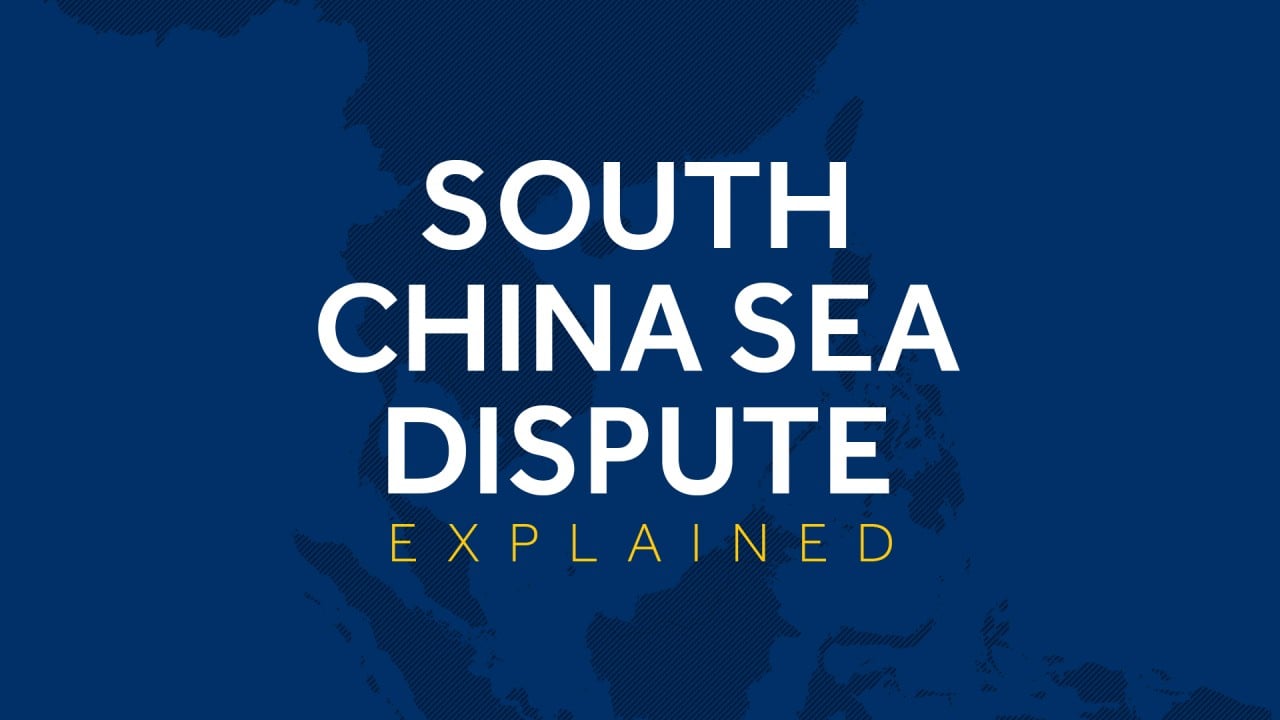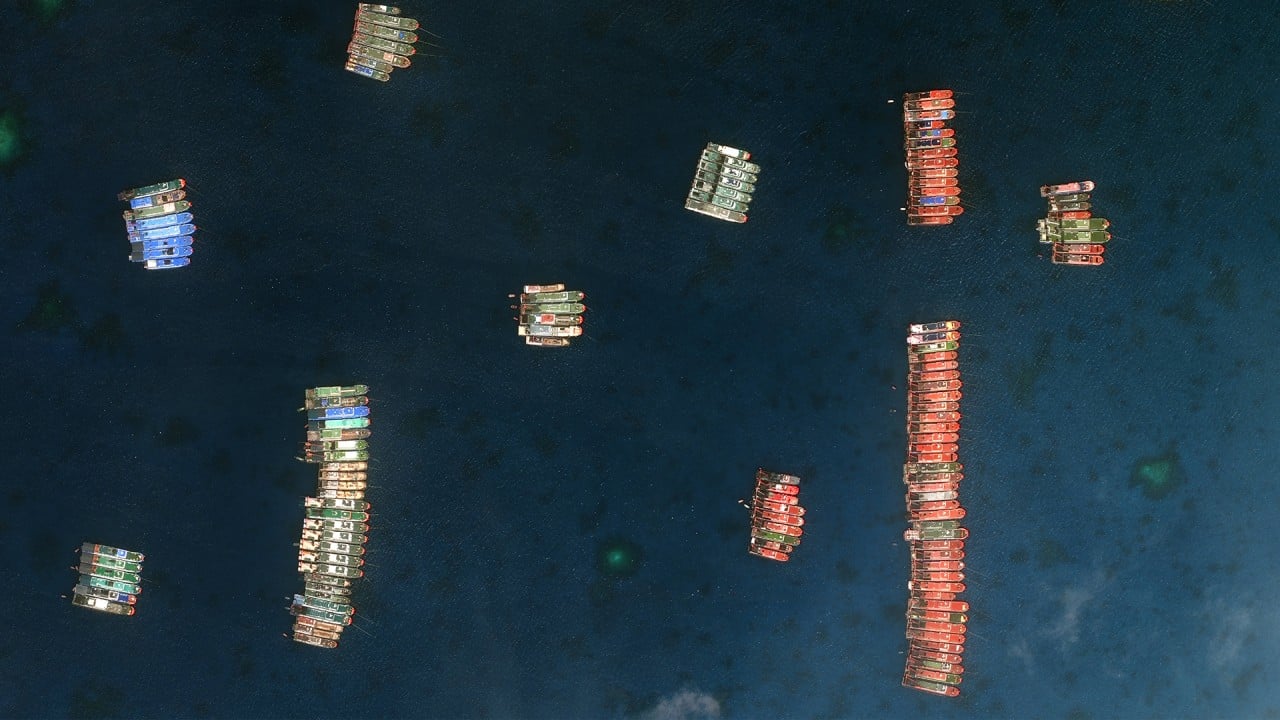
South China Sea: US-Philippines treaty covers Chinese attack, Blinken says
- China says international ruling regarding the resource-rich waterway are a ‘waste of paper’ containing obvious errors and its sovereignty will not be affected
- Statement coincides with anniversary of 2016 international tribunal ruling in favour of Manila’s territorial claims
Chinese foreign ministry spokesman Zhao Lijian said on Monday there were “obvious” errors in the fact-finding and legal application of the ruling, and that the US should first ratify the United Nations Convention on the Law of the Sea (UNCLOS) before pointing fingers at China.
“The South China Sea arbitration ruling is illegal and an invalid waste of paper,” Zhao said. “China’s sovereignty and interests will not be affected by the ruling a bit, and China does not accept any claims or action based on the ruling.
“The US is again politicising the issue of the South China Sea at the fifth anniversary of the illegal ruling – its political intentions are known to all.”
Zhao said the US had conducted close surveillance of the region 2,000 times and conducted about 20 large-scale navy drills with intentions against China this year alone.
On Sunday in the US, Secretary of State Antony Blinken called on Beijing to stop its “provocative behaviour” in the South China Sea and said his country’s mutual defence treaty with the Philippines would cover an attack on Philippine forces, vessels or aircraft in the contentious waters.
He also reasserted the US position – clarified last July by the Trump administration – rejecting all Chinese claims beyond the 12-nautical mile territorial area around the disputed Spratly Islands, and supporting a rules-based maritime order under international laws such as the UNCLOS.

03:23
The South China Sea dispute explained
Blinken’s remarks were timed for the anniversary on Monday of the 2016 international tribunal ruling in favour of the Philippines, which China has never accepted.
“The People’s Republic of China continues to coerce and intimidate Southeast Asian coastal states, threatening freedom of navigation in this critical global throughway,” Blinken said.
“We call on the PRC to abide by its obligations under international law, cease its provocative behaviour and take steps to reassure the international community that it is committed to the rules-based maritime order that respects the rights of all countries, big and small.”
Canada’s foreign ministry also released a statement on Sunday, saying China should comply with the tribunal ruling to peacefully resolve disputes in the South China Sea. It raised concerns about China’s “escalatory and destabilising actions in the East and South China Seas” and said there needed to be transparency in code-of-conduct negotiations.
Canada said it was committed to “defending and revitalising an effective rules-based international order”.
China accuses US destroyer near disputed Paracels of trespassing
Philippine Foreign Secretary Teddy Locsin said on Twitter on Monday that the tribunal ruling had been “pre-eminently a universal victory for the rule of law in the most problematic place: in the wide open sea”.
Beijing has grown increasingly aggressive in asserting its claims to most of the energy-rich waters, which are disputed by Vietnam, Malaysia, Brunei and Taiwan, as well as the Philippines.
In March, the massing of hundreds of Chinese ships near the Spratly Islands prompted diplomatic protests by Manila, which said they were part of China’s maritime militia. Beijing rejected the claim, saying they were fishing vessels sheltering from bad weather.
US-China tensions have continued to flare over the South China Sea issue, with Beijing repeatedly accusing Washington of “open interference” and “provocative actions” through its military presence in the waterway, and dismissing the tribunal ruling as “illegal, null and void”.
The Chinese military’s Southern Theatre Command also slammed the US for “provocative actions” and for violating its sovereignty after the US guided missile destroyer USS Benfold sailed near the disputed Paracel Islands – known by China as the Xisha Islands and Vietnam as the Hoang Sa Islands – in the South China Sea on Monday.

02:37
Philippines sounds alarm over 200 Chinese ships in the South China Sea
In response, the US Seventh Fleet said its warship was conducting a freedom-of-navigation operation near the islands in accordance with international law, and accused the Chinese navy of asserting “excessive and illegitimate maritime claims at the expense of its Southeast Asian neighbours in the South China Sea”.
Meanwhile, further talks for a long-delayed code of conduct in the South China Sea are expected this month between China and Asean.
Zhu Feng, executive director of the China Centre for Collaborative Studies of the South China Sea at Nanjing University, said the US intended to use the anniversary of the arbitration ruling to clearly express its position on the issue.
“[The statement] also shows that Biden administration’s [policy] on the South China Sea is no different from Trump’s policy,” he said. “This statement was expected, as Biden’s policy on China, not just on the South China Sea but on various other issues, has continued and strengthened Trump’s suppression tactics on China.”
US has ramped up reconnaissance in Chinese-claimed waters, says Beijing
Ahead of the Philippines elections next year, Zhu said it remained to be seen if the South China Sea would become a major election issue.
“The overall situation in the South China Sea is relatively unstable now,” he said. “It is a test for how effective China’s policy on Southeast Asia is, as it works to improve communication on this issue and reduce risks here. It will also be a big challenge and test for China, the US and Southeast Asian countries to avoid accidents from occurring in the waters.”
In an opinion piece for nationalist tabloid Global Times on Monday, Wu Shicun, president of China’s National Institute for South China Sea Studies, wrote that the “so-called South China Sea tribunal ruling” had “put on a farcical performance to deny China’s claims”, under the manipulations of the United States.
“This ‘arbitration award’ has long been seen by China as a piece of waste paper, and thrown into the garbage dump of history,” he wrote.
“Some Western countries, particularly the US, due to strategic anxieties from their institutional failings and the decline in their international status, have sought to form ‘small circles’ to contain China in the Asia-Pacific, and will often take out this waste paper ruling from time to time for their own ulterior motives.”
Additional reporting by Jun Mai


